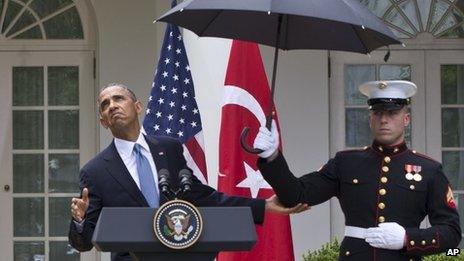Obama tries to tame political tempests
- Published

The Democratic president has run into a spot of political foul weather
President Barack Obama has called for beefed-up embassy security and named a new head of the federal tax agency, as he seeks to steady an administration buffeted by recent political storms.
Mr Obama was distracted by his domestic woes during a joint news conference with the visiting Turkish premier.
The US president also said he would not apologise for the government's seizure of journalists' phone records.
The problems have diverted the agenda of his second-term in its infancy.
For a week, the White House has been fending off attacks about the federal tax agency's targeting of conservative groups; new questions about a deadly attack on the US diplomatic mission in Libya; and the seizure of reporters' phone records.
At Thursday's Rose Garden news conference alongside Turkish Prime Minister Recep Tayyip Erdogan, Mr Obama pledged to ensure there was no "bias" at the Internal Revenue Service (IRS).
"I think we're going to be able to fix it," the Democratic president said. He named White House budget official Daniel Werfel to replace the acting IRS commissioner ousted on Wednesday.
Washington has been in uproar since it emerged that an IRS division had delayed applications for tax-exempt status by Tea Party and other conservative groups.
Joseph Grant, who headed the IRS division responsible, announced that he intends to retire next month.
And with a hearing on the tax agency's misconduct to be held on Friday, the matter is unlikely to go away anytime soon.
Mr Obama also tried to turn the focus of questions about last September's deadly assault on the US mission in Benghazi to US lawmakers, urging them to approve more funding for embassy security.
"I want to say to members of Congress in both parties, we need to come together and truly honour the sacrifice of those four courageous Americans [who died in Libya] and better secure our diplomatic posts around the world," he said.
"That's how we learn the lessons of Benghazi."
The state department is seeking about $1.4bn (£914m) for increased security, largely out of money not spent as part of the US war in Iraq.
But a spokesman for Republican House Speaker John Boehner countered that Congress had already approved extra security funding.
On Wednesday, the White House released 99 pages of emails showing its discussion with the CIA and state department over the nature of the Benghazi attacks. Democrats said the correspondence undermined claims of a cover-up; Republicans suggested the opposite.
The emails show that White House staff requested only minor edits to the so-called talking points about the Benghazi assault, but there were repeated requests from the state department to omit information that might be used to criticise them.
At Thursday's news conference, Mr Obama also made his first comments about the justice department's much-criticised seizure of Associated Press journalists' telephone records.
The information is understood to have been obtained as part of an inquiry into possible leaks, after the news agency last year ran a story about the CIA foiling a Yemeni bomb plot.
Striking a defiant tone, Mr Obama said leaks to news media could endanger the lives of military and intelligence personnel.
"Leaks related to national security can put people at risk," he said.
"And so I make no apologies, and I don't think the American people would expect me, as commander in chief, not to be concerned about information that might compromise their missions or might get them killed."
Mr Obama expressed confidence in his Attorney General, Eric Holder, who has come under fire for the phone-records seizure.
He also said he supported a so-called media shield law to help balance the protection of press freedom against national security needs.
- Published16 May 2013
- Published15 May 2013
- Published15 May 2013
- Published15 May 2013
- Published10 May 2013